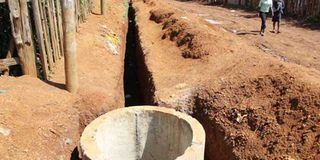Urban areas face health crisis over poor sewerage systems

A sewage line under construction in Eldoret. A new report by Wasreb shows that only 16 per cent of people living in urban centres have access to sewer lines which poses a public health risk. FILE PHOTO | JARED NYATAYA | NATION MEDIA GROUP
What you need to know:
- Currently, rural populations in the country have no such facilities as the Wasreb report shows.
- Warsreb, however, says that it is exploring possibilities of implementing a sewerage levy to cover part of the collection, treatment and disposal costs in urban centres.
- The report is intended to evaluate and assess the performance of the water sector.
Kenya is likely to face a public health crisis following failure to improve sewerage system in urban centres as set out in the Vision 2030.
The latest report released by Water Services Regulatory Board (Wasreb) on review of the country’s water and sewerage services shows that sewage collection and disposal systems in urban areas has remained in a pathetic state.
It had been projected in the National Water Service Strategy that by 2015, at least 40 per cent of Kenyans living in urban areas would have access to sewerage.
However, the Wasreb report shows that only 16 per cent of Kenyans living towns have access to sewer lines.
At the same time, only 30 out of the 215 urban centres in the country have modern sewer systems according to the report.
In the Vision 2030, it is projected that 100 per cent of Kenyans living both in the urban and rural areas should have access to sewer lines.
Currently, rural populations in the country have no such facilities as the Wasreb report shows.
MORE FUNDING NEEDED
“The country risks experiencing undesirable effects such as poor health and diseases, as a result of poor sanitation,” says the report, which also calls for increased funding for the sewerage services.
It goes further to say that in the country’s policy, all investments for water in urban areas must have a sewerage component.
Warsreb, however, says that it is exploring possibilities of implementing a sewerage levy to cover part of the collection, treatment and disposal costs in urban centres.
“We should redouble our efforts to catch up with the demands of the increasing population in the urban centres,” Water and Irrigation Cabinet secretary, Eugene Wamalwa said in speech read on his behalf by his new principal secretary at the Department of Water, Fred Segor during the launching of the impact report on the water sector by Wasreb at a Laico Regency Hotel in Nairobi last week.
PROTECT CONSUMERS
Wasreb is a state corporation whose main aim is to protect consumers by ensuring that water service boards and water service providers provide efficient, affordable and sustainable services.
The report is intended to evaluate and assess the performance of the water sector.
Mr Wamlwa said the country requires about Sh1.2 trillion to ensure the entire pollution has access to clean water as stipulated in Vision 2013, which is the country’s blue print.
He called for concerted efforts by both the national and county governments for this goal to be achieved.
However, the Wasreb report shows there is some progress made in the provision of clean water, which has been attributed to past reforms in the sector where water services were formalised and commercialised.





